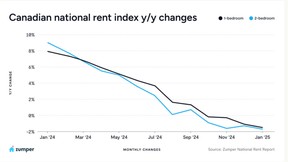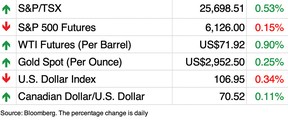Economists worry that we are in ‘substantially worse shape’ than during his last term
Article content

Article content
Article content
Donald Trump’s tariff threats are mounting with each new day.
Yesterday the U.S. president signed a memorandum calling for reciprocal tariffs on all America’s major trading partners.
This followed his announcement that 25 per cent tariffs would be applied to U.S. imports of steel and aluminum products on March 12, of which Canada is a major supplier.
And let’s not forget the threat of hefty duties on all goods from Canada and Mexico, including oil, that is still hanging over our heads.
Advertisement 2
Article content
At this point the steel and aluminum tariffs look the most likely, but Canada went through these in Trump’s last term and economists reckon the country can weather that storm.
Canada sends 90 per cent of its steel and aluminum to the United States, and renewal of tariffs on these sectors will apply to about $24 billion of Canadian exports, according to an estimate by Royal Bank of Canada.
But these sectors together only account for about 0.5 per cent of Canada’s gross domestic product and jobs, and about 3 per cent of Canadian exports overall, said RBC economist Nathan Janzen.
“The broader worry is that international trade uncertainty is not going away,” he said.
After the devastation of the global pandemic followed by two years of lagging growth, Canada’s economy is in “substantially worse shape now” than it was during Trump’s last term, he said. It is in this weakened state that Canada must now contend with tariff threats that could paralyze business investment.
“Weaker business investment threatens to extend a long run of productivity underperformance, and ultimately, weaker Canadian worker wages compared to other parts of the world,” said Janzen.
Article content
Advertisement 3
Article content
The impact is already being felt. More than a third of small and medium-sized businesses in Canada that export goods are experiencing cancelled or paused orders because of the tariff threats, the Canadian Federation of Independent Business said yesterday.
“The uncertainty around tariffs is almost as damaging as tariffs themselves. It reverberates among business owners right now and businesses are adjusting operations on the fly as a result,” said Simon Gaudreault, CFIB’s chief economist.
The threat has sent some businesses into survival mode. A quarter of the businesses surveyed by CFIB said they were considering delaying expansion plans and 20 per cent said they were looking to reduce their workforce or hours worked.
More than 60 per cent say they will be forced to pass on costs to customers if the U.S. imposes tariffs and Canada retaliates.
“About one in five businesses say they can survive less than three months without support if tariffs hit. This should sound an alarm for policymakers,” said Gaudreault.
While much of the attention of Trump’s tariff war have been focused on business and industry, there is another potential victim within Canada’s economy — the housing market.
Advertisement 4
Article content
Confidence is crucial here and any major disruption such as job losses arising from the trade tensions could quench housing demand, said RBC economist Robert Hogue, who flags this risk as a key factor to watch in the coming year.
“Assessing the outlook for Canada’s housing market at this juncture is like putting a price on a home before an earthquake — it’s hard to know what shape the structure will be in at the end of the day,” he said.
Sign up here to get Posthaste delivered straight to your inbox.


Canadian renters got relief for the fourth month in a row in February, with one- and two-bedroom rents falling 1.5 per cent and 1.7 per cent, respectively, from a year ago. The Zumper Canadian Rent Index puts the average one-bedroom rent at $1,856.
The online rental site says a combination of more supply and less demand has driven rents down. The number of rental unit starts has nearly doubled since 2018, adding to inventories, especially in Toronto and Vancouver, where unit completions have outpaced population growth. Ottawa’s drive to reduce immigration is also easing rental demand as fewer foreign students and temporary workers enter the country.
Advertisement 5
Article content
Vancouver is still the most expensive rental market in Canada, but Burnaby, B.C., climbed to second place, overtaking Toronto for the first time since Zumper began tracking Canadian rent prices.

- Today’s Data: Canada factory sales, United States retail sales, industrial production
- Earnings: Air Canada, Enbridge Inc., TC Energy Corp., Magna International Inc., Fairfax Financial Holdings Ltd. Fortis Inc., MTY Food Group Inc.




While inflation has slowed, the cost of living still weighs on Canadians’ wallets as average prices for many items are up across the country. The Financial Post examines how prices fared in five key areas in 2024 and where they could go in 2025. Watch the video now.
Calling Canadian families with younger kids or teens: Whether it’s budgeting, spending, investing, paying off debt, or just paying the bills, does your family have any financial resolutions for the coming year? Let us know at wealth@postmedia.com.
Advertisement 6
Article content
McLister on mortgages
Want to learn more about mortgages? Mortgage strategist Robert McLister’s Financial Post column can help navigate the complex sector, from the latest trends to financing opportunities you won’t want to miss. Plus check his mortgage rate page for Canada’s lowest national mortgage rates, updated daily.
Financial Post on YouTube
Visit the Financial Post’s YouTube channel for interviews with Canada’s leading experts in business, economics, housing, the energy sector and more.
Today’s Posthaste was written by Pamela Heaven, with additional reporting from Financial Post staff, The Canadian Press and Bloomberg.
Have a story idea, pitch, embargoed report, or a suggestion for this newsletter? Email us at posthaste@postmedia.com.
Recommended from Editorial
-

Five reasons why Canada would not be better off as the 51st state
-

‘Rolling tariff threats’ to rock Canada’s economy
Bookmark our website and support our journalism: Don’t miss the business news you need to know — add financialpost.com to your bookmarks and sign up for our newsletters here
Article content
Trump’s tariffs could hit Canada harder this time around
2025-02-14 13:03:23







